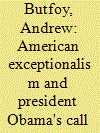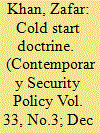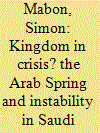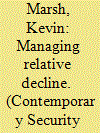|
|
|
Sort Order |
|
|
|
Items / Page
|
|
|
|
|
|
|
| Srl | Item |
| 1 |
ID:
116295


|
|
|
|
|
| Publication |
2012.
|
| Summary/Abstract |
President Obama came to office promising to make abolition of nuclear weapons a central policy goal. Conventional explanations for the arguably poor progress made here (explanations which focus on political and bureaucratic processes) fail to capture an important part of the story. This is that the president comes from a political tradition marked by exceptionalist assumptions. This tradition encompasses a distinctly American attempt to converge idealism and realism; it seeks change, but also constrains aspirations within conservative limits. His conception of exceptionalism is based on a presumption of American moral leadership integrated with a requirement for continued American strategic primacy. As a result, his view of abolition requires global acceptance of American conventional military superiority, reinforcing doubts about the vision's prospects.
|
|
|
|
|
|
|
|
|
|
|
|
|
|
|
|
| 2 |
ID:
116300


|
|
|
|
|
| Publication |
2012.
|
| Summary/Abstract |
A reaction by the Indian military to a series of violent crises with Pakistan, beginning with the Kargil conflict of 1999, Cold Start Doctrine (CSD) envisions limited attacks on Pakistan territory as non-nuclear retaliation against asymmetric and proxy attacks. Cold Start Doctrine and Pakistani responses show that the South Asian region is still adjusting to the consequences of overt nuclearization in 1998. India and Pakistan remain prone to arms racing and vulnerable to destablization. CSD is part of an action-reaction process, increasing risks of war and the risk that nuclear weapons would be used should war occur. It worsens the natural tension between India's desire for resolution through conventional conflict and Pakistan's declared willingness to escalate to nuclear first use. For India, CSD increases incentives to abandon its previous commitment to nuclear No First Use. Probable Pakistani responses include development of tactical nuclear weapons, forward deployment of nuclear forces, and pre-delegation of launch authority, increasing its problems of force protection, command and control, and escalation control. This article concludes, based on reliable sources, that neither of these war-like strategies benefits the two nuclear rivals as each state's policy options confront certain issues that invite strategic instability in South Asian region and should be reconsidered.
|
|
|
|
|
|
|
|
|
|
|
|
|
|
|
|
| 3 |
ID:
116299


|
|
|
|
|
| Publication |
2012.
|
| Summary/Abstract |
This article assesses the significance of American diplomatic intervention in the de-escalation of two South Asian nuclear crises - the 1999 Kargil conflict and the 2001-2002 military stand-off. The American role in those crises is often referred to as crisis manager or secondary in the context of the region's strategic and crisis stability. A careful analysis of American diplomatic interventions, however, reveals that the role is much greater, conceptualized here as deterrence diplomacy, meaning intense, focused diplomatic activity specifically to forestall crisis escalation and the outbreak of large-scale Indo-Pakistani war. More than is commonly realized, the United States was integral in the crisis strategies of both countries. It played a pivotal role preventing crisis escalation and the outbreak of large-scale conflict between India and Pakistan in both confrontations. And the American role was instrumental in the termination of those confrontations, particularly the Kargil conflict. Without America's effective deterrence diplomacy, any of the past South Asian crises could have escalated to the nuclear level. No global generalization can be made from this analysis because it is mostly South Asia specific. However, it is plausible to argue that the United States, as the key systemic power, will have an important role in future regional deterrence.
|
|
|
|
|
|
|
|
|
|
|
|
|
|
|
|
| 4 |
ID:
116298


|
|
|
|
|
| Publication |
2012.
|
| Summary/Abstract |
While the revolutions of the 2011 Arab Spring deposed and replaced previously embedded autocratic regimes, the Kingdom of Saudi Arabia remained largely trouble free. This article examines how the ruling Al Saud family was able to prevent the violent manifestation of tensions within Saudi Arabia. It is argued here that through the process of state-formation mechanisms were created to ensure the stability of the regime, a framework initially intended to protect the regime from coup d'etats. The long-term application of coup-proofing strategies cannot successfully respond to the challenges emanating from non-military sources. This analysis concludes that the Saudi monarchy has avoided short-term instability, but longer-term pressures facing the Al Saud family necessitate domestic reform. However, regional dynamics, driven by fears of an expansionist, nuclear Iran, a changing regional balance of power, and an apparent American exceptionalism for Saudi Arabia, make this reform unlikely.
|
|
|
|
|
|
|
|
|
|
|
|
|
|
|
|
| 5 |
ID:
116296


|
|
|
|
|
| Publication |
2012.
|
| Summary/Abstract |
The Defense Strategic Guidance (DSG), released by the White House in January 2012, was widely acknowledged as the most significant reassessment of America's strategic posture in a decade. Sustaining U.S. Global Leadership: Priorities for 21st Century Defense is not simply a response to systemic-level threats and interests, but reflected principles best articulated by neoclassical realism (NCR). By examining systemic, domestic, and elite influences affecting the United States in 2012, this article demonstrates that the DSG illustrates the core principles of neoclassical realism. The strategy reflected the Obama administration's filtration of systemic-level imperatives through elite perceptions and domestic politics. The DSG is realist because it sought foremost to address systemic challenges, including American relative decline. It is neoclassical realist because the strategy was markedly influenced by elite perceptions and domestic politics, resulting in deliberate gambles. Neorealism continues to have great value explaining systemic trends, but it cannot explain the specific foreign policies of individual states. NCR provides a way to retain the most effective analytical features of neorealism while incorporating the influence of domestic politics and elite perceptions on state policy-making. Neoclassical realism is a promising theoretical framework for foreign policy analysis, but further testing and refining is needed to ensure that it retains its descriptive accuracy and predictive capability.
|
|
|
|
|
|
|
|
|
|
|
|
|
|
|
|
| 6 |
ID:
116293


|
|
|
|
|
| Publication |
2012.
|
| Summary/Abstract |
It has long been assumed that progress toward arms control and disarmament is possible only after constituting legal frameworks from which such an action could be initiated. Although the legal framework regarding a particular weapon might be questioned for its effectiveness, the related practices of legalization themselves are rarely interrogated. This article problematizes practices of legalization in the field of arms control and disarmament. It builds upon innovations by critical security studies scholars to scrutinize the ICRC's engagement with the problem of conventional weapons, especially landmines. Study of practices of legalization demonstrate the embeddedness of legal discourses in the regulation and prohibition of weapons. It compels, state and non-state actors to represent their interests in legal terms and represents their efforts as attempts towards developing existing legal frameworks. This article acknowledges the experiences with practices of legalization in the preceding half-century of arms control and disarmament negotiations. A reflection on these experiences exposes the limitations and possibilities of practices of legalization and encourages alternative approaches to regulating and prohibiting weapons.
|
|
|
|
|
|
|
|
|
|
|
|
|
|
|
|
| 7 |
ID:
116294


|
|
|
|
|
| Publication |
2012.
|
| Summary/Abstract |
Strategic-cultural studies continue to proliferate, but scholars still cannot agree on fundamental matters like what a strategic culture is and what it does. This article examines the debates about strategic culture at the philosophical level - especially the debate between Alistair Iain Johnston, who prefers a positivist approach, and Colin Gray, who champions interpretivism - and finds that most conceptual models suffer from one of two general problems (and some models exhibit both). Existing models tend to be stated in a manner which is too coherent, meaning they can't account for occasional strategic-behavioural inconsistencies, and/or they suggest too much continuity and cannot thereby adequately account for changes in strategic policy over time. Instead, a model is offered which treats a singular strategic culture as containing multiple co-existing strategic subcultures. These subcultures each present a different interpretation of a state's international social/cultural context - who a state's 'friends' and 'foes' are - which in turn affects how that state interprets the material variables - geography, relative power, technological change, etc. - relevant to strategic decision-making. These different paradigms compete in public discourse for influence over strategic decision-making. This synthesis solves both the 'too-coherent' and the 'too-much-continuity' problems.
|
|
|
|
|
|
|
|
|
|
|
|
|
|
|
|
| 8 |
ID:
116297


|
|
|
|
|
| Publication |
2012.
|
| Summary/Abstract |
If the international community cannot dissuade Iran from becoming either a nuclear threshold country or an explicit nuclear power, then the manner in which deterrence is extended is of utmost importance to Turkish security. Turkish security will ultimately be damaged by Iranian attempts to acquire a nuclear bomb. The credibility of extended deterrence will surely be the key factor in averting regional decisions to opt for nuclear status in the face of a likely threshold nuclear Tehran. Current proposals regarding missile defence and precision guided weapons as optimum tools of deterrence fall short as alternatives compared with a credible reliable nuclear deterrence. So as long as NATO maintains a credible mix of nuclear and conventional means of deterrence, and guarantees allied security via strengthened extended assurance, Turkey will be comfortable when confronted with new nuclear states in its region. Ankara's likely response is expected to favour strengthening security relations with the Euro-Atlantic community and seeking to bolster the American/NATO security guarantee, rather than decoupling from the alliance. As long as American/NATO extended deterrence is adapted to the new conditions and continuity is assured, a Turkish decision to decouple from the Western alliance or opt for its own individual nuclear capability remains only a distant possibility.
|
|
|
|
|
|
|
|
|
|
|
|
|
|
|
|
|
|
|
|
|